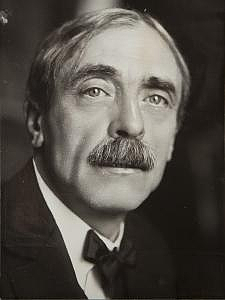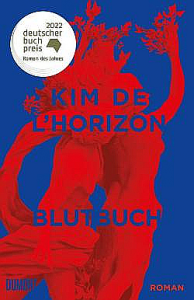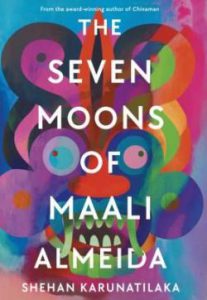Fleurs du Mal Magazine



Au bois dormant
La princesse, dans un palais de rose pure,
Sous les murmures, sous la mobile ombre dort,
Et de corail ébauche une parole obscure
Quand les oiseaux perdus mordent ses bagues d’or.
Elle n’écoute ni les gouttes, dans leurs chutes,
Tinter d’un siècle vide au lointain le trésor,
Ni, sur la forêt vague, un vent fondu de flûtes
Déchirer la rumeur d’une phrase de cor.
Laisse, longue, l’écho rendormir la diane,
Ô toujours plus égale à la molle liane
Qui se balance et bat tes yeux ensevelis.
Si proche de ta joue et si lente la rose
Ne va pas dissiper ce délice de plis
Secrètement sensible au rayon qui s’y pose.
Paul Valéry
(1871-1945)
Au bois dormant
Poème
Album de vers anciens
• fleursdumal.nl magazine
More in: Archive U-V, Archive U-V, Valéry, Paul

Eeuwenhout
(Een droom)
Is het valsheid in geschrifte wanneer ik
uit vannacht noteer dat waar de paarden
graasden het gras weerbarstig was?
Streelde daar bij Eeuwenhout hun manen,
kende niet hun namen maar ze roken naar
de weergalm van gebeden uit een oude tijd.
Vervolgens stak ik langs diens linkerzijde
traag een heel lang mes het hart in van een
stille, vreemde man. Amper zat er bloed
aan toen ik het terugtrok. Hoe merkwaardig.
Je zou denken dat het er van druipen zou.
Wat smaakte even later toch het bier me goed.
Bert Bevers
Eeuwenhout (Een droom)
Verschenen in het Droomnummer van Gierik & NVT, Antwerpen, 2017
Bert Bevers is dichter en schrijver
Hij woont en werkt in Antwerpen (Be)
• fleursdumal.nl magazine
More in: Archive A-B, Archive A-B, Bevers, Bert

Vereinsamt
I. Die Krähen schrei’n
Die Krähen schrein
Und ziehen schwirren Flugs zur Stadt:
Bald wird es schnein. –
Wohl dem, der jetzt noch Heimat hat!
Nun stehst du starr,
Schaust rückwärts, ach! wie lange schon!
Was bist Du Narr
Vor Winters in die Welt entflohn?
Die Welt – ein Tor
Zu tausend Wüsten stumm und kalt!
Wer das verlor,
Was du verlorst, macht nirgends halt.
Nun stehst du bleich,
Zur Winter-Wanderschaft verflucht,
Dem Rauche gleich,
Der stets nach kältern Himmeln sucht.
Flieg, Vogel, schnarr
Dein Lied im Wüstenvogel-Ton! –
Versteck, du Narr,
Dein blutend Herz in Eis und Hohn!
Die Krähen schrein
Und ziehen schwirren Flugs zur Stadt:
Bald wird es schnein. –
Weh dem, der keine Heimat hat.
II. Antwort
Daß Gott erbarm’!
Der meint, ich sehnte mich zurück
In’s deutsche Warm.
In’s dumpfe deutsche Stuben-Glück!
Mein Freund, was hier
Mich hemmt und und hält, ist dein Verstand,
Mitleid mit dir!
Mitleid mit deutschem Quer-Verstand!
Friedrich Nietzsche
(1844 – 1900)
Vereinsamt
• fleursdumal.nl magazine
More in: Archive M-N, Archive M-N, Friedrich Nietzsche, Nietzsche

The Destroyer
I am of the wind…
A wisp of the battering wind…
I trail my fingers along the Alps
And an avalanche falls in my wake…
I feel in my quivering length
When it buries the hamlet beneath…
I hurriedly sweep aside
The cities that clutter our path…
As we whirl about the circle of the globe…
As we tear at the pillars of the world…
Open to the wind,
The Destroyer!
The wind that is battering at your gates.
Lola Ridge
(1873-1941)
The Destroyer
• fleursdumal.nl magazine
More in: Archive Q-R, Archive Q-R, Ridge, Lola
A tender and compellling memoir of the author’s grandparents, their literary salon, and a way of life that is no more.
The House of Twenty Thousand Books is the story of Chimen Abramsky, an extraordinary polymath and bibliophile who amassed a vast collection of socialist literature and Jewish history. For more than fifty years Chimen and his wife, Miriam, hosted epic gatherings in their house of books that brought together many of the age’s greatest thinkers.
 The atheist son of one of the century’s most important rabbis, Chimen was born in 1916 near Minsk, spent his early teenage years in Moscow while his father served time in a Siberian labor camp for religious proselytizing, and then immigrated to London, where he discovered the writings of Karl Marx and became involved in left-wing politics.
The atheist son of one of the century’s most important rabbis, Chimen was born in 1916 near Minsk, spent his early teenage years in Moscow while his father served time in a Siberian labor camp for religious proselytizing, and then immigrated to London, where he discovered the writings of Karl Marx and became involved in left-wing politics.
He briefly attended the newly established Hebrew University in Jerusalem, until World War II interrupted his studies.
Back in England, he married, and for many years he and Miriam ran a respected Jewish bookshop in London’s East End. When the Nazis invaded Russia in June 1941, Chimen joined the Communist Party, becoming a leading figure in the party’s National Jewish Committee. He remained a member until 1958, when, shockingly late in the day, he finally acknowledged the atrocities committed by Stalin. In middle age, Chimen reinvented himself once more, this time as a liberal thinker, humanist, professor, and manuscripts’ expert for Sotheby’s auction house.
Journalist Sasha Abramsky re-creates here a lost world, bringing to life the people, the books, and the ideas that filled his grandparents’ house, from gatherings that included Eric Hobsbawm and Isaiah Berlin to books with Marx’s handwritten notes, William Morris manuscripts and woodcuts, an early sixteenth-century Bomberg Bible, and a first edition of Descartes’s Meditations. The House of Twenty Thousand Books is a wondrous journey through our times, from the vanished worlds of Eastern European Jewry to the cacophonous politics of modernity.
The Book includes 43 photos.
“Sasha Abramsky’s account of his grandfather’s devotion to books and reading is a moving testimonial to the persistance of human curiosity in a world that seems to drift farther and farther from the delight of intellectual pursuits. It is a moving, instructive, astonishing account of one man’s love for the printed word that all readers will appreciate. The House of Twenty Thousand Books deserves twenty hundred thousand readers.”
— Alberto Manguel
Sasha Abramsky was born and raised in the UK, studied politics, philosophy and economics at Balliol College, Oxford, and moved to the US in my early 20s. He has lived and worked in London, New York, and in California. His writings have been published in the Nation magazine, the New Yorker online, the New York Times, Atlantic, Mother Jones, Truthout, Sacramento Magazine, Slate, Salon, and many other publications in the US. In the UK he has written for a number of publications, including the Guardian, the Observer, the Sunday Telegraph, and the New Statesman.
The House of Twenty Thousand Books
by Sasha Abramsky, with a new preface by the author
Publisher: New York Review Books
Reprint edition 2017
Language: English
Paperback
376 pages
ISBN-10: 1681371138
ISBN-13: 978-1681371139
$17.95
• fleursdumal.nl magazine
More in: #Biography Archives, - Book Lovers, - Book Stories, Alberto Manguel, Archive A-B, Libraries in Literature, Literaire sporen, The Art of Reading

Maid Quiet
Where has Maid Quiet gone to,
Nodding her russet hood?
The winds that awakened the stars
Are blowing through my blood.
O how could I be so calm
When she rose up to depart?
Now words that called up the lightning
Are hurtling through my heart.
William Butler Yeats
(1865-1939)
Maid Quiet
• fleursdumal.nl magazine
More in: Archive Y-Z, Archive Y-Z, Yeats, William Butler

The Norwegian mother
She walks thinly along the narrow road
back to the school, as I walk towards her.
We stop and talk. She tells me that her
Illness has spread to her head. Her hand
radars around her face grimly.
What can you do? You carry on as you do
when you have three young children
who need your care. My family in Norway
are no help, nor is my husband’s here.
He has given up work to care for the kids.
Who cares for you? I ask.
Have you a good community around you?
The women of the mosque come round
with food every day.
They feed my husband and the family.
You carry on and don’t think about the future.
She looks at her watch. I apologise for taking up
her time. There is a recorder concert, she grins,
and presses ears in pretence of pain as she walks on.
Vincent Berquez
Poem: The Norwegian mother
Vincent Berquez is a London–based artist and poet
• fleursdumal.nl magazine
More in: Archive A-B, Archive A-B, Berquez, Vincent, Vincent Berquez
“Some girls are not made,” torrin a. greathouse writes, “but spring from the dirt.”
 Guided by a devastatingly precise hand, Wound from the Mouth of a Wound—selected by Aimee Nezhukumatathil as the winner of the 2020 Ballard Spahr Prize for Poetry—challenges a canon that decides what shades of beauty deserve to live in a poem. greathouse celebrates “buckteeth & ulcer.”
Guided by a devastatingly precise hand, Wound from the Mouth of a Wound—selected by Aimee Nezhukumatathil as the winner of the 2020 Ballard Spahr Prize for Poetry—challenges a canon that decides what shades of beauty deserve to live in a poem. greathouse celebrates “buckteeth & ulcer.”
She odes the pulp of a bedsore. She argues that the vestigial is not devoid of meaning, and in kinetic and vigorous language, she honors bodies the world too often wants dead.
These poems ache, but they do not surrender. They bleed, but they spit the blood in our eyes. Their imagery pulses on the page, fractal and fluid, blooming in a medley of forms: broken essays, haibun born of erasure, a sonnet meant to be read in the mirror. greathouse’s poetry demands more of language and those who wield it. “I’m still learning not to let a stranger speak / me into a funeral.”
Concrete and evocative, Wound from the Mouth of a Wound is a testament to persistence, even when the body is not allowed to thrive. greathouse—elegant, vicious, “a one-girl armageddon” draped in crushed velvet—teaches us that fragility is not synonymous with flaw.
torrin a. greathouse is a transgender cripple-punk poet and essayist. Her work is published in POETRY, Ploughshares, and The Kenyon Review. She is a 2021 NEA Literature Fellow. Their debut collection Wound from the Mouth of a Wound (Milkweed Editions, 2020), was the winner of the 2022 Kate Tufts Discovery Award. She teaches at the Rainier Writing Workshop, the low-residency MFA program at Pacific Lutheran University.
Wound from the Mouth of a Wound
Poems
By torrin a. greathouse
Paperback
Publisher: Milkweed Editions
Language: English
Paperback: 88 pages
ISBN-10: 1571315276
ISBN-13: 978-1571315274
Publish. Date: 12/22/2020
$16.00
• fleursdumal.nl magazine
More in: #Editors Choice Archiv, - Book News, - Bookstores, Archive G-H, Archive G-H
A comprehensive overview of Richard Long’s career, selected by the artist himself and encompassing his artworks from the 1960s to today.

Richard Long has been at the forefront of land art for more than half a century. A pioneer of conceptual practices in the 1960s, Long takes sculpture out of the studio into nature and around the world, using time, space, distance, navigation, perception, the elements, and the geological forces that have shaped the landscape as both his tools and his vocabulary.
Many Rivers to Cross is a personal overview of Richard Long’s career, including works selected by the artist and spanning the late 1960s to the present day. It covers his practice in all its forms: walks, photographs, text works, large installations, mud works, and drawings, including some early unpublished works as well as many seminal and celebrated projects.
A number of short backstories written by Long not only provide insight into the context and making of key works, but also evoke the sense of freedom and adventure of an epic journey across foreign landscapes. Texts include a recent conversation between Long and internationally acclaimed composer and musician Nitin Sawhney; a dialogue about the recreation of Muddy Water Circle at Frieze Masters in London with Lisson Gallery; and a discussion with curator Alkistis Dimaki on the occasion of the presentation of Athens Slate Line at the Acropolis, Athens. The book also includes documentation of works presented internationally in museums and galleries.
Sir Richard Long, CBE, is one of Britain’s foremost sculptors and land artists. Short-listed four times for the Turner Prize, he won the award in 1989 for White Water Line. He was elected to the Royal Academy of Arts in 2001 and for more than fifty years his work has been exhibited at major galleries throughout the world. Richard Long lives and works in Bristol, the city in which he was born.
Many Rivers to Cross
by Richard Long (Author)
Publisher : Thames & Hudson
June 21, 2022
Language: English
Hardcover: 424 pages
ISBN-10 : 050097120X
ISBN-13 : 978-0500971208
$70.00
• fleursdumal.nl magazine
More in: - Book News, Archive K-L, Art & Literature News, Land Art, Richard Long, Sculpture
Winner of the 2022 Publish Triangle Trans and Gender-Variant Literature Award. Finalist for the 2021 Northern California Book Award in Poetry.
A thrilling, discursive second collection from “a poet for this hour—bewildered, hopeful, and cracklingly alive” (Mark Doty).
 The poems in Ari Banias’s thrilling and discursive second collection, A Symmetry, unsettle the myth of a benevolently ordered reality. Through uncanny repetitions and elliptical inquiry, Banias contends with the inscriptions of nationhood, language, and ancestral memory in the architectures of daily experience.
The poems in Ari Banias’s thrilling and discursive second collection, A Symmetry, unsettle the myth of a benevolently ordered reality. Through uncanny repetitions and elliptical inquiry, Banias contends with the inscriptions of nationhood, language, and ancestral memory in the architectures of daily experience.
Refusing the nostalgias of classicism and the trap of authenticity, these poems turn instead to a Greece of garbage strikes and throwaway tourist pleasures, where bad gender means bad grammar, and a California coast where mansions offer themselves to be crushed under your thumb.
A piece of citrus hurled into one poem’s apartment window rolls downhill and escapes the narrative altogether in another. Farmers destroy their own olive trees, strangers mesmerize us as they fold sheets into perfect corners, “artists who design border wall prototypes are artists / who say they “leave politics out of it.’” Climate collapse and debt accelerate, and desire transforms itself in the ruins.
From within psychic interiors and iconic sites—the museum, the strip mall, the discotheque, the sea—A Symmetry attends to the intimate, social proportions of our material world and discerns the simmering potential of a present that “can be some other way. And is.”
Ari Banias is the author of Anybody, a finalist for the Kate Tufts Discovery Award and the PEN Center USA Award for Poetry. His poems have appeared in the Kenyon Review, Poetry, and the Nation, among other publications. He lives in Oakland, California.
Ari Banias:
A Symmetry
Poems
October 2021
Publishers: W. W. Norton & Company
ISBN: 978-0-393-86813-5
112 pages
Hardcover
$26.95
• fleursdumal.nl magazine
More in: #Editors Choice Archiv, - Book News, Archive A-B, Archive A-B
Die Erzählfigur in ›Blutbuch‹ identifiziert sich weder als Mann noch als Frau.
 Aufgewachsen in einem schäbigen Schweizer Vorort, lebt sie mittlerweile in Zürich, ist den engen Strukturen der Herkunft entkommen und fühlt sich im nonbinären Körper und in der eigenen Sexualität wohl.
Aufgewachsen in einem schäbigen Schweizer Vorort, lebt sie mittlerweile in Zürich, ist den engen Strukturen der Herkunft entkommen und fühlt sich im nonbinären Körper und in der eigenen Sexualität wohl.
Doch dann erkrankt die Großmutter an Demenz, und das Ich beginnt, sich mit der Vergangenheit auseinanderzusetzen: Warum sind da nur bruchstückhafte Erinnerungen an die eigene Kindheit? Wieso vermag sich die Großmutter kaum von ihrer früh verstorbenen Schwester abzugrenzen?
Und was geschah mit der Großtante, die als junge Frau verschwand? Die Erzählfigur stemmt sich gegen die Schweigekultur der Mütter und forscht nach der nicht tradierten weiblichen Blutslinie.
Dieser Roman ist ein stilistisch und formal einzigartiger Befreiungsakt von den Dingen, die wir ungefragt weitertragen: Geschlechter, Traumata, Klassenzugehörigkeiten.
Kim de l’Horizon macht sich auf die Suche nach anderen Arten von Wissen und Überlieferung, Erzählen und Ichwerdung, unterspült dabei die linearen Formen der Familienerzählung und nähert sich einer flüssigen und strömenden Art des Schreibens, die nicht festlegt, sondern öffnet.
Kim de l’Horizon, geboren 2666 auf Gethen. In der Spielzeit 21/22 war Kim Hausautor an den Bühnen Bern. Vor dem Debüt ›Blutbuch‹ versuchte Kim mit Nachwuchspreisen attention zu erringen – u. a. mit dem Textstreich-Wettbewerb für ungeschriebene Lyrik, dem Treibhaus-Wettkampf für exotische Gewächse und dem Damenprozessor. Heute hat Kim aber genug vom »ICH«, studiert Hexerei bei Starhawk, Transdisziplinarität an der ZHdK und textet kollektiv im Magazin DELIRIUM. ›Blutbuch‹ wurde mit dem Literaturpreis der Jürgen Ponto-Stiftung ausgezeichnet und ist nominiert für den Deutschen Buchpreis 2022.
Ausgezeichnet mit dem Deutschen Buchpreis 2022
Blutbuch
Kim de l’Horizon
Roman
336 Seiten
DuMont Buchverlag
Erscheinungstag: 19.07.2022
ISBN 978-3-8321-8260-1
Gebunden
€ 24,00
• fleursdumal.nl magazine
More in: - Book News, - Bookstores, Archive G-H, Awards & Prizes
The Seven Moons of Maali Almeida was announced as the winner of the Booker Prize 2022 on October 17 at a ceremony in London.
Shehan Karunatilaka’s second novel is a searing, mordantly funny satire set amid the murderous mayhem of a Sri Lanka beset by civil war.
 Maali Almeida, war photographer, gambler and closet gay, has woken up dead in what seems to be a celestial visa office. His dismembered body is sinking in the Beira Lake and he has no idea who killed him. At a time when scores are settled by death squads, suicide bombers and hired goons, the list of suspects is depressingly long.
Maali Almeida, war photographer, gambler and closet gay, has woken up dead in what seems to be a celestial visa office. His dismembered body is sinking in the Beira Lake and he has no idea who killed him. At a time when scores are settled by death squads, suicide bombers and hired goons, the list of suspects is depressingly long.
But even in the afterlife, time is running out for Maali. He has ‘seven moons’ to try and contact the man and woman he loves most and lead them to a hidden cache of photos that will rock Sri Lanka.
“Life after death in Sri Lanka: an afterlife noir, with nods to Dante and Buddha and yet unpretentious. Fizzes with energy, imagery and ideas against a broad, surreal vision of the Sri Lankan civil wars. Slyly, angrily comic.”
— The 2022 judges Booker Prize on The Seven Moons of Maali Almeida
• fleursdumal.nl magazine
More in: - Book News, - Bookstores, Archive K-L, Awards & Prizes
Thank you for reading Fleurs du Mal - magazine for art & literature